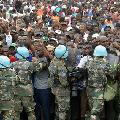
Appalling ‘humanitarian’ record of the ‘international community’ continues
Violent clashes in Haiti between protesters and United Nations troops on 14 November left at least two dead and 16 wounded in the country’s second city, Cap-Haitien. Street barricades forced shut the city’s public buildings and airport and a police station was set alight. Other protests and shootings were reported in Hinche and Gonaïves. Government authorities fear that unrest could spread to the capital, Port-au-Prince, which was devastated by January’s earthquake that left 250,000 dead and millions homeless.
The protests were sparked by the outbreak of a cholera epidemic that has, so far, officially caused over 1,000 deaths and 1,000 new cases every day. There is widespread speculation that Nepalese UN troops inadvertently introduced the disease, which closely resembles a south Asian variant. When Hurricane Tomas brushed the island on 5 November, the waterways spilled over, creating ideal conditions for the spread of cholera. This re-enforced long-standing resentment towards UN troops amongst Haitians. UN ‘peace-keeping’ troops have grown to 12,000 since a coup overthrew, with US backing, the ‘leftist’ populist President Jean-Bertrand Aristide, in 2004.
There is also widespread anger towards the government of President René Préval, which is regarded as corrupt and feeble and blamed for failing to stop the spread of cholera. Foreign diplomats are now speculating whether elections set for 28 November will go ahead.
What began as an isolated diarrhoea case one month ago in the rural Artibonite valley, has rapidly led to over 17,000 people being taken to hospital. Epidemiologists warn that now it is in the water supply it can last for months or years. The disease has now reached Port-au-Prince, which is still in ruins following January’s earthquake.
Cholera is caused by a water-borne bacterium called Vibrio cholera. Left untreated, it causes dirreahea, vomiting, dehydration and shock. It can kill within just 24 hours. The disease creates few problems where there is clean water, sanitation and hygiene but Haiti, the poorest country in the Western Hemisphere, is particularly vulnerable. There is not one sewage plant in the whole country, although the rich have septic systems in their homes. Even before the earthquake, Haitians lived in over-crowded and unsanitary conditions. Now many of Port-au-Prince’s 3 million people live in tent cities, next to open sewers. Throughout the country, many people are forced to get water from the same rivers where people also wash and defecate.
Cholera is relatively easy to cure if patients are given antibiotics in time but Haiti’s impoverished country’s health service is hopelessly unable to cope. Poverty and a ruined infrastructure mean many Haitians come looking for medical help too later, or not at all.
The United Nations estimates that 200,000 Haitians could get infected by the disease and appealed to the ‘international community’ for $163 million emergency aid appeal. But the appalling ‘humanitarian’ record of the major capitalist governments towards Haiti can give the poor no confidence whatsoever. Ten months after the earthquake, 1.5 million Haitians remain homeless and most of Port-au-Prince is still reduced to rubble. Only a tiny fraction of the $5 billion pledged by world governments for reconstruction, including over $1 billion from its neighbouring US superpower, has actually reached Haiti. A plethora of largely unaccountable charities and NGOs that have sprung up in Haiti in recent years, can, at best, only benefit a tiny fraction of the tide of humanity that is in desperate need.
On the basis of capitalism, the vast majority of Haitians will remain impoverished, jobless, illiterate and hungry and living in shantytowns and tents. This existence means that the mass of people will remain highly vulnerable to diseases and ‘natural disasters’. Some 80% live below the poverty line. Joblessness sits at a staggering 75%.
Democratic control of resources
More than ever, the Haitian masses need to have democratic control of the resources in society. Socialists call for immediate and fully funded emergency medical aid to combat the cholera epidemic, as well as a massive post-earthquake reconstruction programme, through elected committees of workers, land labourers and poor people in every area. The masses of Haiti urgently need good quality, quake-proof standard, housing, hospitals, schools, roads and infrastructure, including access to clean water and sanitation, and other vital public resources and services. Socialists oppose the unjust trade policies imposed on Haiti by the big capitalist powers and call for all foreign debts to be cancelled. We call for jobs and a living wage for all and for state subsidies for struggling small farmers. Living standards can only be transformed by bringing the main planks of the economy into public ownership, under democratic workers’ control and management.
For decades, Haiti has been plagued by poverty, joblessness and military dictatorships. The huge social gap between the poor Creole-speaking black majority, that make up 95% of the population, and the French-speaking rich, 1% of whom own nearly half the country’s wealth, remains untouched. Workers and the poor in Haiti need their own independent class organisations, trade unions and a mass party with a socialist programme, to fight for real fundamental change. Socialists demand an end to imperialist meddling- UN forces out of Haiti! –for a socialist Haiti, as part of a voluntary and equal socialist federation of the Caribbean.

Be the first to comment